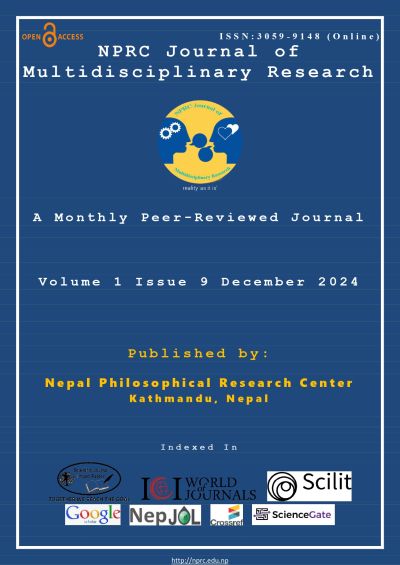A Bibliometric Examination of Sanitation Issues and Challenges in Nepal: Identifying Research Trends and Knowledge Gaps
DOI:
https://doi.org/10.3126/nprcjmr.v1i9.74138Keywords:
Bibliometric analysis, Nepal, Research trends, Sanitation, WASHAbstract
Background and Objective: This study delves into the bibliometric examination of sanitation issues and challenges in Nepal, aiming to identify research trends and knowledge gaps in the WASH sector. Nepal has set ambitious targets under SDG 6 to ensure water and sanitation access for all but faces significant hurdles due to its mountainous terrain and climate vulnerability.
Methodology: Data for this study was sourced from Dimensions.ai, focusing on publications related to sanitation issues in Nepal from 2013 to 2024. A bibliometric analysis was conducted to analyze publication trends, citation ratios, top sources, and countries contributing to research on sanitation in Nepal.
Key Findings: The analysis revealed fluctuating research output over the years, with Health Sciences leading in publication frequency. Notable organizations such as the Institute of Engineering and the London School of Hygiene & Tropical Medicine emerged as key contributors to research output and influence. Citation numbers have shown a general increase, indicating growing academic engagement and impact in addressing sanitation challenges in Nepal.
Conclusion: The findings underscore the diverse yet evolving landscape of research on sanitation issues in Nepal. While progress has been made, there is a pressing need for heightened awareness and targeted interventions, particularly at the local level, to tackle the multifaceted challenges in sanitation. Enhanced collaboration among countries and organizations, coupled with improved dissemination of research findings, can bolster effective adaptation strategies and public health initiatives in Nepal.
Downloads
Downloads
Published
How to Cite
Issue
Section
License
Copyright (c) 2024 The Author(s)

This work is licensed under a Creative Commons Attribution-NonCommercial 4.0 International License.
This license enables reusers to distribute, remix, adapt, and build upon the material in any medium or format for noncommercial purposes only, and only so long as attribution is given to the creator.





